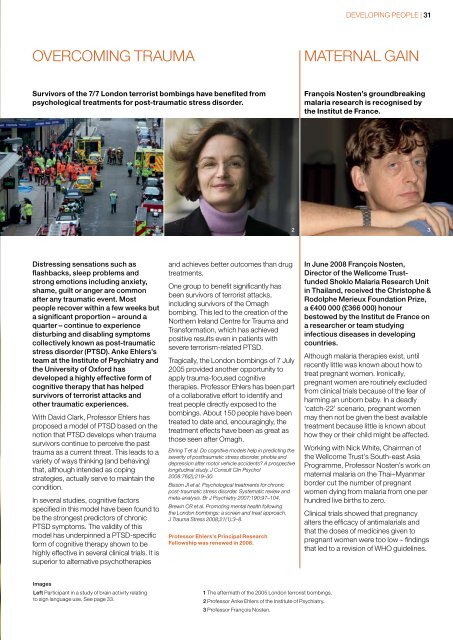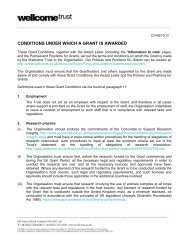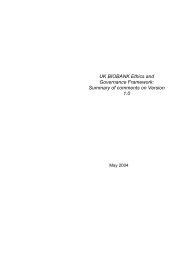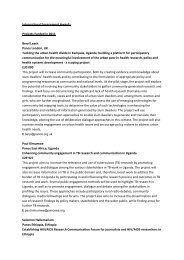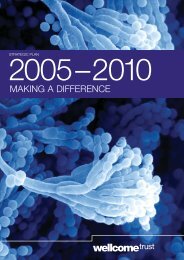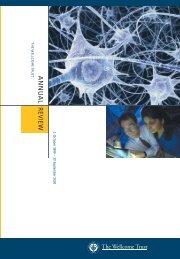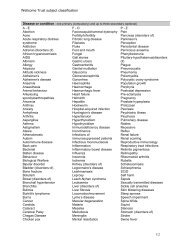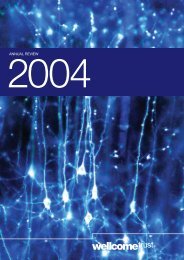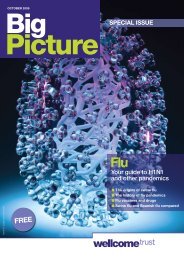Create successful ePaper yourself
Turn your PDF publications into a flip-book with our unique Google optimized e-Paper software.
DEVELOPING PEOPLE | 31<br />
Overcoming trauma<br />
Maternal gain<br />
Survivors of the 7/7 London terrorist bombings have benefited from<br />
psychological treatments for post-traumatic stress disorder.<br />
François Nosten’s groundbreaking<br />
malaria research is recognised by<br />
the Institut de France.<br />
1 2 3<br />
Distressing sensations such as<br />
flashbacks, sleep problems and<br />
strong emotions including anxiety,<br />
shame, guilt or anger are common<br />
after any traumatic event. Most<br />
people recover within a few weeks but<br />
a significant proportion – around a<br />
quarter – continue to experience<br />
disturbing and disabling symptoms<br />
collectively known as post-traumatic<br />
stress disorder (PTSD). Anke Ehlers’s<br />
team at the Institute of Psychiatry and<br />
the University of Oxford has<br />
developed a highly effective form of<br />
cognitive therapy that has helped<br />
survivors of terrorist attacks and<br />
other traumatic experiences.<br />
With David Clark, Professor Ehlers has<br />
proposed a model of PTSD based on the<br />
notion that PTSD develops when trauma<br />
survivors continue to perceive the past<br />
trauma as a current threat. This leads to a<br />
variety of ways thinking (and behaving)<br />
that, although intended as coping<br />
strategies, actually serve to maintain the<br />
condition.<br />
In several studies, cognitive factors<br />
specified in this model have been found to<br />
be the strongest predictors of chronic<br />
PTSD symptoms. The validity of this<br />
model has underpinned a PTSD-specific<br />
form of cognitive therapy shown to be<br />
highly effective in several clinical trials. It is<br />
superior to alternative psychotherapies<br />
and achieves better outcomes than drug<br />
treatments.<br />
One group to benefit significantly has<br />
been survivors of terrorist attacks,<br />
including survivors of the Omagh<br />
bombing. This led to the creation of the<br />
Northern Ireland Centre for Trauma and<br />
Transformation, which has achieved<br />
positive results even in patients with<br />
severe terrorism-related PTSD.<br />
Tragically, the London bombings of 7 July<br />
2005 provided another opportunity to<br />
apply trauma-focused cognitive<br />
therapies. Professor Ehlers has been part<br />
of a collaborative effort to identify and<br />
treat people directly exposed to the<br />
bombings. About 150 people have been<br />
treated to date and, encouragingly, the<br />
treatment effects have been as great as<br />
those seen after Omagh.<br />
Ehring T et al. Do cognitive models help in predicting the<br />
severity of posttraumatic stress disorder, phobia and<br />
depression after motor vehicle accidents? A prospective<br />
longitudinal study. J Consult Clin Psychol<br />
2008:76(2);219–30.<br />
Bisson JI et al. Psychological treatments for chronic<br />
post-traumatic stress disorder. Systematic review and<br />
meta-analysis. Br J Psychiatry 2007;190:97–104.<br />
Brewin CR et al. Promoting mental health following<br />
the London bombings: a screen and treat approach.<br />
J Trauma Stress 2008;21(1):3–8.<br />
Professor Ehlers’s Principal Research<br />
Fellowship was renewed in 2008.<br />
In June 2008 François Nosten,<br />
Director of the <strong>Wellcome</strong> <strong>Trust</strong>funded<br />
Shoklo Malaria Research Unit<br />
in Thailand, received the Christophe &<br />
Rodolphe Merieux Foundation Prize,<br />
a €400 000 (£366 000) honour<br />
bestowed by the Institut de France on<br />
a researcher or team studying<br />
infectious diseases in developing<br />
countries.<br />
Although malaria therapies exist, until<br />
recently little was known about how to<br />
treat pregnant women. Ironically,<br />
pregnant women are routinely excluded<br />
from clinical trials because of the fear of<br />
harming an unborn baby. In a deadly<br />
‘catch-22’ scenario, pregnant women<br />
may then not be given the best available<br />
treatment because little is known about<br />
how they or their child might be affected.<br />
Working with Nick White, Chairman of<br />
the <strong>Wellcome</strong> <strong>Trust</strong>’s South-east Asia<br />
Programme, Professor Nosten’s work on<br />
maternal malaria on the Thai–Myanmar<br />
border cut the number of pregnant<br />
women dying from malaria from one per<br />
hundred live births to zero.<br />
Clinical trials showed that pregnancy<br />
alters the efficacy of antimalarials and<br />
that the doses of medicines given to<br />
pregnant women were too low – findings<br />
that led to a revision of WHO guidelines.<br />
Images<br />
Left Participant in a study of brain activity relating<br />
to sign language use. See page 33.<br />
1 The aftermath of the 2005 London terrorist bombings.<br />
2 Professor Anke Ehlers of the Institute of Psychiatry.<br />
3 Professor François Nosten.


